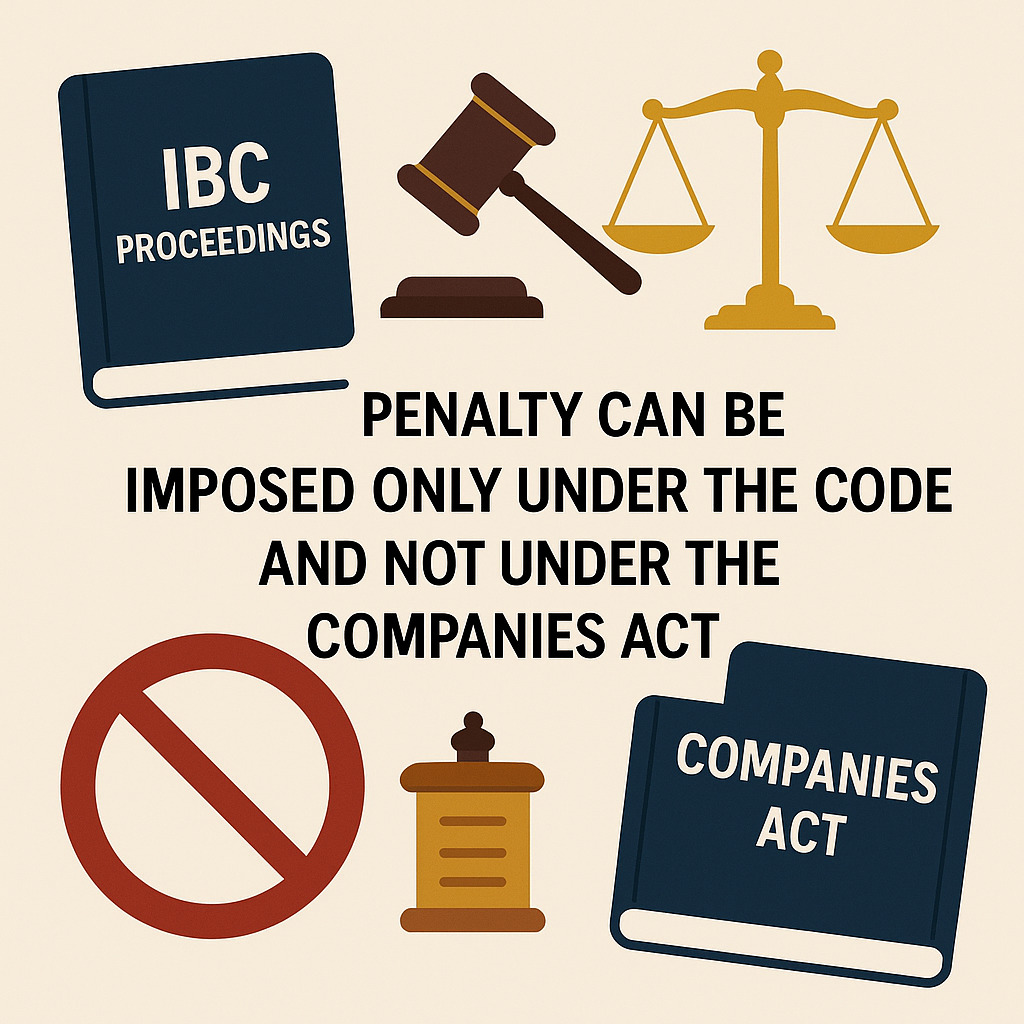View News
In-IBC-Proceedings-Penalty-Can-Be-Imposed-Only-Under-The-Code-And-Not-Under-The-Companies-Act-NCLAT

In IBC Proceedings, Penalty Can Be Imposed Only Under The Code And Not Under The Companies Act: NCLAT
Introduction
In a significant judgment, the National Company Law Appellate Tribunal (NCLAT) has held that penalties in insolvency proceedings must be strictly governed by the Insolvency and Bankruptcy Code, 2016 (IBC) and not by the Companies Act, 2013. This judgment brings much-needed clarity on the interplay between the two legislations in the context of insolvency proceedings.
The ruling was delivered by a Division Bench of Justice Ashok Bhushan (Chairperson) and Dr. Alok Srivastava (Technical Member) in the case of Mr. Ashish Chaturvedi v. Inox Leisure Limited.
Background of the Case
The case emerged from proceedings initiated under Section 9 of the IBC by Inox Leisure Limited, an operational creditor, against Mr. Ashish Chaturvedi, the suspended director of the corporate debtor. During the course of the proceedings, certain alleged non-compliances were identified.
The Adjudicating Authority (NCLT) had, in its earlier order, made certain observations and sought to impose a penalty referring to provisions under the Companies Act, 2013, for non-compliance or delay on the part of the suspended management.
Aggrieved by this, Mr. Chaturvedi approached the NCLAT, contending that the imposition of penalties under the Companies Act was beyond the jurisdiction of the Adjudicating Authority when the case was squarely being heard under the framework of the IBC.
Key Issue for Consideration
The central issue before the Appellate Tribunal was:
Whether the Adjudicating Authority (NCLT) can impose penalties under the Companies Act, 2013, in matters being adjudicated under the Insolvency and Bankruptcy Code, 2016.
NCLAT's Observations
The NCLAT analyzed the scheme, scope, and intent of the IBC. It noted the following key points:
-
Exclusive Jurisdiction Under IBC
The Tribunal emphasized that once a proceeding is initiated under the IBC, all consequential matters, including actions against directors and officers of the corporate debtor, must be governed by the Code and the rules/regulations framed thereunder. -
No Dual Penalty Regime
It held that permitting the imposition of penalties under the Companies Act, while proceedings are pending under the IBC, would result in a dual regime, leading to jurisdictional conflicts and multiplicity of proceedings, which is not envisaged by the Code. -
Role of the Adjudicating Authority
The Adjudicating Authority under IBC (i.e., the NCLT) exercises jurisdiction specifically assigned under the Code. While the same tribunal may act as a forum for adjudication under the Companies Act in other contexts, it cannot import provisions of the Companies Act into an IBC matter, unless specifically provided. -
Penalty Framework Under IBC
The IBC itself contains penal provisions, such as Section 70 (punishment for misconduct during CIRP) and Section 74 (punishment for contravention of resolution plan or moratorium), and hence, is self-contained for the purposes of enforcement and penalties during insolvency.
Tribunal’s Verdict
The NCLAT concluded that:
"When proceedings are carried out under the Insolvency and Bankruptcy Code, 2016, any penalty, if found warranted, must be imposed strictly in accordance with the provisions of the Code, and not under the Companies Act, 2013."
Accordingly, the impugned directions of the NCLT imposing penalties under the Companies Act were set aside.
Legal Significance of the Ruling
This decision is a reaffirmation of the supremacy of IBC in insolvency proceedings. It has the following implications:
-
Prevents overreach by Adjudicating Authorities in applying external statutory provisions.
-
Ensures clarity of jurisdiction and legal certainty for suspended directors, management, and stakeholders.
-
Encourages the consistent application of the IBC without importing unrelated compliance burdens during CIRP or liquidation.
-
Reinforces that while NCLT is a common forum, its role and powers vary depending on the statutory frameworkunder which it acts.
Conclusion
The NCLAT’s decision in Ashish Chaturvedi v. Inox Leisure Limited serves as a guiding precedent for future cases where questions arise about overlapping or conflicting powers under IBC and the Companies Act. It draws a clear jurisdictional boundary, ensuring that insolvency proceedings are adjudicated with discipline, focus, and statutory fidelity.
Stakeholders, especially suspended directors and resolution professionals, must now be reassured that during IBC proceedings, only the Code will dictate punitive outcomes, providing a more predictable and uniform legal framework.
"Unlock the Potential of Legal Expertise with LegalMantra.net - Your Trusted Legal Consultancy Partner”
Disclaimer: Every effort has been made to avoid errors or omissions in this material in spite of this, errors may creep in. Any mistake, error or discrepancy noted may be brought to our notice which shall be taken care of in the next edition In no event the author shall be liable for any direct indirect, special or incidental damage resulting from or arising out of or in connection with the use of this information Many sources have been considered including Newspapers, Journals, Bare Acts, Case Materials , Charted Secretary, Research Papers etc

